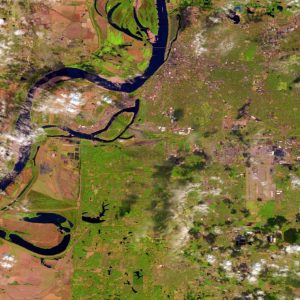The Stream, October 4: Canada Wildfires Will Increase Due To Warmer, Drier Weather
The Global Rundown
Wildfires in Canada could burn twice as large an area each year by the end of the century as climate change brings warmer and drier conditions. India’s interstate river management and dispute resolution system needs an overhaul in the wake of violent protests over water sharing in the Cauvery River Basin, according to water experts. A Chinese initiative to reduce urban flooding by creating “sponge cities” is making uneven progress. Floods in North Korea have affected hundreds of thousands of people, leaving many vulnerable as winter approaches. A blockade of Mexico’s largest gold mine forced the mine’s owner to temporarily suspend operations this week. The state of Rio de Janeiro may soon privatize its water and sewage utility.
“There’s a fundamental flaw in the way we manage our rivers.” –Himanshu Thakkar, coordinator for the South Asia Network on Dams, Rivers and People in Delhi, on a series of ongoing, interstate water disputes in India. Tensions flared between Karnataka and Tamil Nadu last month over sharing of the Cauvery River, triggering violent protests that killed two people and cost the city of Bangalore $3.75 billion. (Bloomberg)
By The Numbers
600,000 people Number in North Korea who have been affected by severe flooding, according to the International Federation of Red Cross and Red Crescent Societies. The aid organization is asking for $15.6 million to help those displaced by the floods, and says the situation is especially urgent because winter conditions are expected to arrive by the end of the month. Reuters
860,300 ounces Amount of gold produced at Goldcorp’s Penasquito mine in Mexico last year, equal to a quarter of the company’s output. Goldcorp temporarily closed the mine this week due to a blockade by a trucking contractor and local landowners who are demanding jobs, water, and payment for environmental damages. Reuters
Science, Studies, And Reports
Canada will likely experience warmer and drier conditions by the end of the century due to climate change, with temperatures potentially rising as much as 4 degrees Celsius. As a result, the number of large wildfires will increase and the area burned by fires each year will double, according to a report by Natural Resources Canada. Yale Environment 360
On The Radar
China is two years into a pilot program to create “sponge cities” that will reduce flooding by implementing green infrastructure such as permeable pavement, green spaces, and interconnected waterways. Progress varies among the 16 cities participating in the program, according to officials, but they share challenges including increased urbanization, accurately incorporating local hydrology, and persuading the private sector to invest in the projects. Guardian
The water and sewage utility in Brazil’s Rio de Janeiro state could be privatized within the next two years. The state is struggling financially due to declining oil revenue, and is facing pressure from the federal government to sell assets. Reuters
A news correspondent for Circle of Blue based out of Hawaii. She writes The Stream, Circle of Blue’s daily digest of international water news trends. Her interests include food security, ecology and the Great Lakes.
Contact Codi Kozacek




